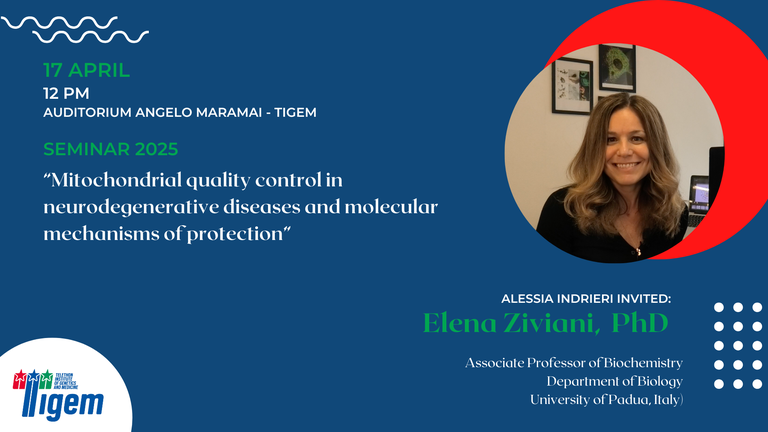Elena Ziviani, PhD - "Mitochondrial quality control in neurodegenerative diseases and molecular mechanisms of protection"
- When Apr 17, 2025 from 12:00 PM to 01:15 PM (Europe/Berlin / UTC200)
- Where Auditorium Angelo Maramai
- Contact Name Alessia Indrieri
- Contact Phone 08119230659
-
Add event to calendar
iCal

- https://www.tigem.it/newsroom/seminars/elena-ziviani-phd-mitochondrial-quality-control-in-neurodegenerative-diseases-and-molecular-mechanisms-of-protection
- Elena Ziviani, PhD - "Mitochondrial quality control in neurodegenerative diseases and molecular mechanisms of protection"
- 2025-04-17T12:00:00+02:00
- 2025-04-17T13:15:00+02:00
Elena Ziviani, PhD
Associate Professor of Biochemistry
Department of Biology
University of Padua
Italy
Short CV
Abstract
Mitochondrial dysfunction and quality control has become a central theme in neurodegenerative diseases. Ubiquitination of mitochondrial membrane proteins is a critical step preceding mitophagy. We recently discovered that basal mitophagy can be enhanced in vivo in flies and in cells by reducing either the levels or activity of the proteasome-associated deubiquitinating enzyme USP14. We knocked down USP14 in two established fly models of mitochondrial dysfunction, and this restored mitochondria function and ultrastructure, and brain dopamine levels. Remarkably, at the systemic level it extended the flies’ lifespan and rescued climbing behavior. An orally bioavailable small-molecule inhibitor of USP14, IU1, had similarly beneficial effects on these mutant flies. The best existing USP14 inhibitors, generated by modification of IU1, have single-digit nanomolar potency and selectivity in the range of 500-fold. These compounds are well tolerated by rodents, their pharmacokinetics has been characterized, and they can cross the blood-brain barrier. Studies on the effects of USP14 inhibition in mammalian neurons have not yet been conducted. To close this gap, we exploited iNeurons differentiated from human embryonic stem cells (hESCs) to investigate the potential beneficial effect of enhancing mitophagy in models known to accumulate dysfunctional mitochondria. We also investigated the underlying mechanism of suppression, using acute, time-resolved models of USP14 inhibition in iNeurons in conjunction with state-of-the-art quantitative global proteomics, with a key goal being to identify the substrate or substrates of USP14 whose deubiquitination negatively regulates basal mitophagy.
